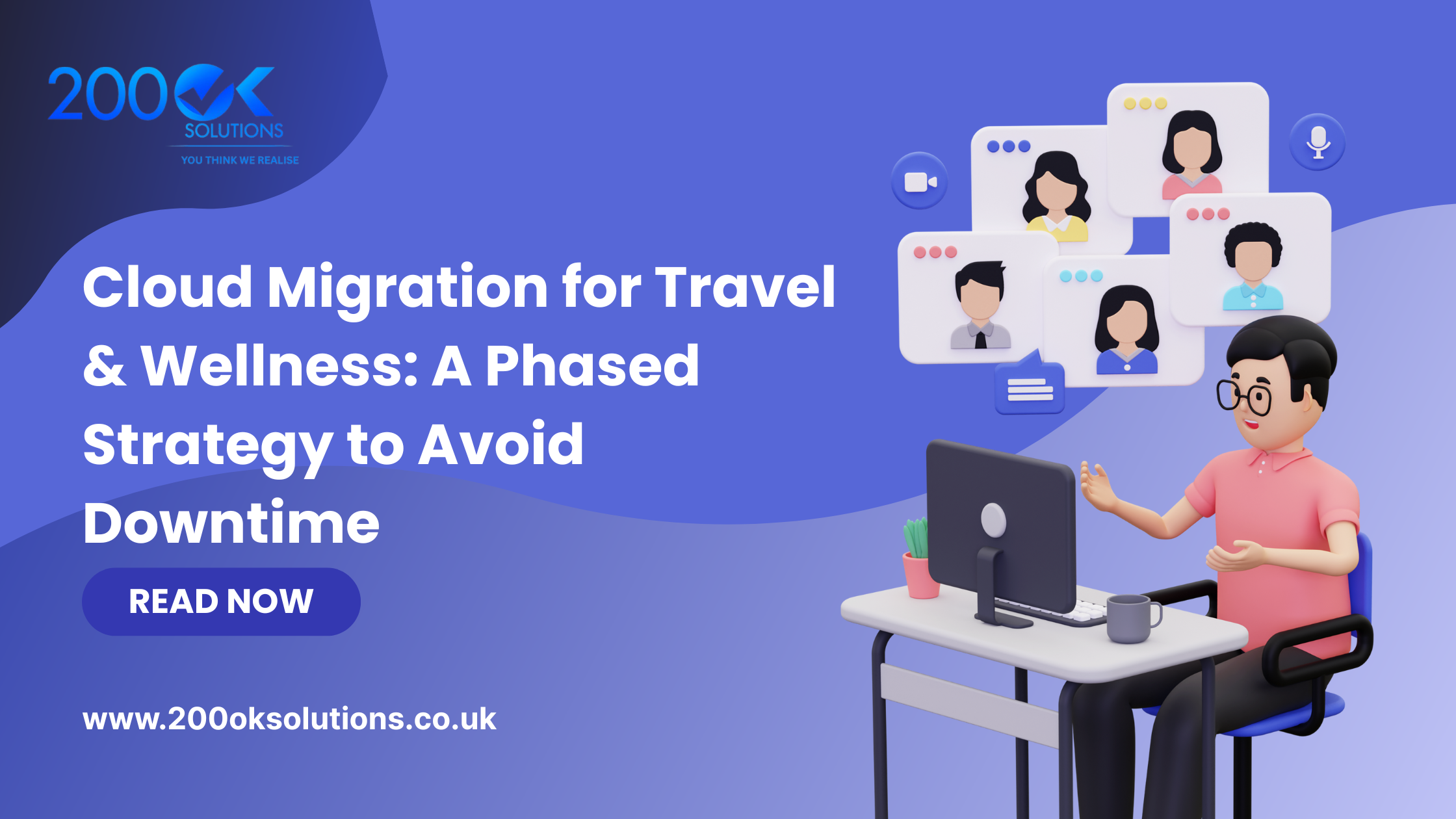Cloud migration for travel and wellness businesses requires a strategic, phased approach to ensure zero downtime and maintain customer trust. This comprehensive guide demonstrates how travel agencies, hotels, spas, and wellness retreats can successfully transition to cloud platforms like AWS and Azure without disrupting bookings, customer data, or daily operations. By implementing a phased migration strategy, hospitality businesses can reduce risks by 75%, maintain continuous service availability, and achieve cloud migration benefits including 40% cost reduction and improved scalability within 6-12 months.
Understanding Cloud Migration in Travel and Wellness Sectors
What is Phased Cloud Migration?
Phased cloud migration is a systematic approach where businesses move their IT infrastructure, applications, and data to the cloud in controlled stages rather than all at once. For UK travel and wellness businesses, this methodology is critical because:
- Continuous operations: Guest bookings, spa appointments, and wellness sessions continue uninterrupted
- Risk mitigation: Problems can be identified and resolved in isolated phases
- Budget flexibility: Costs are spread across multiple quarters
- Staff training: Teams adapt gradually to new cloud systems
Why Travel and Wellness Businesses Need Cloud Solutions
The travel cloud and wellness tech landscape has transformed dramatically. UK hospitality cloud adoption has accelerated due to:
- Remote booking systems: 87% of UK travellers book accommodations online
- Real-time inventory management: Hotels and wellness retreats need instant availability updates
- Data security compliance: GDPR and UK data protection regulations
- Scalability demands: Seasonal fluctuations in tourism require flexible infrastructure
- Integration requirements: Wellness apps, booking engines, and payment systems must work seamlessly
Traditional on-premises servers cannot match the agility that modern travel agency cloud migration provides.

Benefits of Cloud Migration for UK Hotels and Wellness Businesses in 2025
Operational Advantages
Cost Efficiency
- Reduce infrastructure expenses by 30-50%
- Eliminate physical server maintenance costs
- Pay only for resources actually used during peak and off-peak seasons
Scalability and Flexibility
- Handle booking surges during holiday periods automatically
- Scale wellness app cloud integration based on member growth
- Support multiple locations from centralized cloud infrastructure
Enhanced Security
- Advanced encryption for customer payment data
- Automated backup systems protecting guest information
- Compliance with UK hospitality regulations and international standards
Improved Customer Experience
- Faster website and booking engine performance (50% reduction in load times)
- Mobile-friendly wellness apps with real-time synchronization
- Seamless integration across travel agency systems
Business Intelligence Benefits
Cloud strategy for wellness businesses UK enables:
- Real-time analytics on booking patterns and guest preferences
- Predictive maintenance for spa equipment through IoT integration
- Dynamic pricing algorithms based on demand forecasting
- Comprehensive customer relationship management across all touchpoints
Challenges in Hospitality Cloud Migration UK

Common Obstacles
Legacy System Integration
- Many UK hotels operate booking systems from the 1990s-2000s
- Wellness retreats often use specialized management software incompatible with modern cloud platforms
- Point-of-sale systems in spas may lack API connectivity
Data Migration Complexity
- Years of customer booking history requiring careful transfer
- Membership databases for wellness centers containing sensitive health information
- Multi-format data across different systems (reservations, payments, inventory)
Downtime Risks
- A single hour of booking system downtime can cost hotels £5,000-£50,000
- Spa appointment systems going offline damage customer trust permanently
- Travel agencies lose competitive advantage when websites are unavailable
Staff Resistance and Training Requirements
- Hotel reception staff accustomed to legacy interfaces
- Wellness practitioners hesitant about technology changes
- Management concerns about productivity during transition periods

Regulatory and Compliance Concerns
UK travel cloud providers must address:
- GDPR compliance for EU guest data
- PCI DSS standards for payment processing
- UK accessibility requirements for booking systems
- Industry-specific regulations for wellness and medical spa facilities
Step-by-Step Phased Migration: No Downtime for Travel Businesses
Phase 1: Assessment and Planning (Weeks 1-4)
Infrastructure Audit
- Document all current systems (booking engines, PMS, CRM, wellness apps)
- Identify dependencies between applications
- Catalog data volumes and types
- Map network architecture and integrations
Cloud Readiness Evaluation
- Assess which applications are cloud-ready versus requiring refactoring
- Evaluate data sovereignty requirements for UK customer information
- Determine compliance needs specific to hospitality cloud environments
- Calculate total cost of ownership for AWS travel versus Azure hospitality solutions
Stakeholder Engagement
- Create cross-functional migration team (IT, operations, customer service)
- Define success metrics (uptime targets, performance benchmarks)
- Establish communication protocols for staff and customers
- Set realistic timelines acknowledging seasonal business cycles
Risk Assessment Matrix Create a detailed analysis covering:
- Critical systems requiring 24/7 availability
- Acceptable maintenance windows (typically 2-4 AM for UK businesses)
- Fallback procedures if migration issues occur
- Customer communication strategy during transition

Phase 2: Pilot Migration (Weeks 5-8)
Select Non-Critical Systems First
Begin with low-risk components:
- Internal staff communication tools
- Marketing email platforms
- Document management systems
- Analytics and reporting tools
Hybrid Cloud Setup for UK Spas and Retreats
Implement a dual-environment approach:
- Maintain existing on-premises systems fully operational
- Deploy parallel cloud infrastructure
- Configure secure connectivity between environments
- Test data synchronization mechanisms
Testing Protocol
- Conduct load testing simulating peak booking periods
- Verify data integrity across both environments
- Test failover mechanisms
- Train pilot user groups on cloud systems
Phase 3: Database and Data Migration (Weeks 9-16)
Data Migration Strategy
Pre-Migration
- Clean and deduplicate customer databases
- Archive historical data not requiring real-time access
- Validate data integrity and completeness
- Create comprehensive backups
Migration Execution
- Use incremental data replication to minimize downtime
- Schedule full migration during lowest-traffic windows
- Implement real-time synchronization between old and new databases
- Verify data accuracy post-migration through automated testing
Zero-Downtime Database Migration Techniques
For UK hotels and travel agencies:
Blue-Green Deployment
- Run old system (Blue) and new cloud system (Green) simultaneously
- Route new bookings to Green environment gradually
- Maintain Blue as instant fallback option
- Complete switchover only after 100% confidence
Database Replication
- Set up continuous replication from on-premises to cloud
- Monitor replication lag (should be under 5 seconds)
- Test read operations from cloud database while writes continue on-premises
- Switch write operations during planned maintenance window

Phase 4: Application Migration (Weeks 17-24)
Booking Engine and PMS Migration
Critical considerations for no downtime migration:
- Deploy cloud-based booking engine in parallel
- Configure real-time inventory synchronization
- Implement session management to prevent double bookings
- Test payment gateway integration thoroughly
- Gradually redirect traffic using DNS management
Wellness App Cloud Integration Phased Approach
For spas and wellness retreats:
- Migrate user authentication systems first
- Transfer member profiles and preferences
- Move appointment scheduling systems
- Integrate wearable device data streams
- Deploy wellness content and video libraries
API Gateway Implementation
Create abstraction layer that:
- Routes requests to appropriate system (legacy or cloud)
- Provides seamless experience during transition
- Enables gradual component migration
- Facilitates rollback if issues arise

Phase 5: Website and Customer-Facing Systems (Weeks 25-28)
Travel Agency Website Migration
Content Delivery Network (CDN) Setup
- Deploy global CDN for faster page loads across UK and internationally
- Implement caching strategies for static content
- Use progressive migration approach for dynamic content
- Monitor performance metrics continuously
Booking Flow Optimization
- Migrate search functionality to cloud infrastructure
- Move availability checking systems
- Transfer payment processing (ensuring PCI compliance)
- Deploy confirmation and communication systems
- Implement comprehensive booking flow testing
Mobile Experience Enhancement
- Optimize cloud infrastructure for mobile responsiveness
- Ensure wellness app cloud integration provides offline capability
- Implement progressive web app features
- Test across devices and network conditions

Phase 6: Testing and Optimization (Weeks 29-32)
Comprehensive Testing Checklist
Functional Testing
- Verify all booking scenarios (single, group, packages)
- Test payment processing across methods (cards, PayPal, bank transfers)
- Confirm email and SMS notifications delivery
- Validate reporting and analytics accuracy
Performance Testing
- Simulate peak load conditions (3x normal traffic)
- Measure response times under stress
- Test database query optimization
- Verify auto-scaling triggers work correctly
Security Testing
- Conduct penetration testing on cloud infrastructure
- Validate encryption for data at rest and in transit
- Test access controls and authentication
- Verify compliance with UK hospitality regulations
User Acceptance Testing
- Train staff on cloud-based systems
- Gather feedback from reception, spa, and management teams
- Conduct customer journey testing from booking to checkout
- Refine workflows based on real-world usage

Phase 7: Full Cutover and Monitoring (Weeks 33-36)
Final Migration Steps
Cutover Planning
- Schedule cutover during lowest-traffic period
- Communicate with customers about brief maintenance
- Redirect DNS to cloud infrastructure
- Monitor systems intensively for 48-72 hours
- Maintain on-premises systems as backup for 2 weeks
Decommissioning Legacy Systems
Only after confirming:
- All data successfully migrated and validated
- Staff comfortable with new cloud systems
- Performance metrics meeting or exceeding targets
- No critical issues for 30 consecutive days
- Complete documentation of cloud architecture
Ongoing Monitoring
Implement continuous monitoring for:
- System uptime and availability (target: 99.9%)
- Application performance and response times
- Database query performance
- Security threat detection
- Cost optimization opportunities

Cloud Migration Roadmap: Wellness Sector UK 2025
Timeline Overview
| Phase | Duration | Key Deliverables | Risk Level |
| Assessment & Planning | 4 weeks | Migration strategy, cloud architecture | Low |
| Pilot Migration | 4 weeks | Non-critical systems moved | Low |
| Database Migration | 8 weeks | Data in cloud with synchronization | Medium |
| Application Migration | 8 weeks | Core systems operational in cloud | Medium-High |
| Website Migration | 4 weeks | Customer-facing systems on cloud | High |
| Testing & Optimization | 4 weeks | Validated performance | Medium |
| Full Cutover | 4 weeks | Complete cloud operation | High |
Total Timeline: 36 weeks (9 months)
Resource Requirements
Personnel
- Cloud architect (full-time)
- Database administrator (full-time)
- 2-3 developers (full-time)
- Project manager (full-time)
- Security specialist (part-time)
- Training coordinator (part-time)
Technology
- UK cloud providers infrastructure (AWS or Azure)
- Migration tools (AWS DMS, Azure Migrate)
- Testing environments
- Monitoring and management platforms
Budget Considerations
Typical costs for mid-size UK hotel or wellness retreat:
- Cloud infrastructure setup: £15,000-£40,000
- Migration tools and licenses: £8,000-£20,000
- Professional services: £30,000-£80,000
- Training and change management: £5,000-£15,000
- Contingency (20%): £12,000-£31,000
Total Investment: £70,000-£186,000
Expected ROI: 18-24 months through operational savings and increased revenue from improved systems.
AWS Migration Strategy: Travel Industry UK
Why AWS for Travel and Hospitality
AWS travel solutions offer:
- Global infrastructure with UK data centers (London region)
- Comprehensive compliance certifications (ISO 27001, PCI DSS)
- Hotel and travel-specific solutions (AWS for Hospitality)
- Integration with popular travel technology platforms
- Advanced analytics through AWS analytics services
Key AWS Services for Travel Businesses
Amazon EC2 and Auto Scaling
- Host booking engines and websites
- Automatically handle traffic spikes during promotions
- Right-size instances for cost optimization
Amazon RDS
- Managed database services for booking and customer data
- Automated backups and point-in-time recovery
- Multi-AZ deployment for high availability
Amazon S3 and CloudFront
- Store property images and wellness content
- Deliver content globally through CDN
- 99.999999999% durability for critical data
AWS Lambda
- Serverless functions for booking confirmations
- Process payment webhooks
- Generate reports on demand
Amazon CloudWatch
- Monitor system performance 24/7
- Set alerts for anomalies
- Track custom metrics for bookings and revenue

Phased AWS Strategy for Travel Agencies UK
Month 1-2: Foundation
- Set up AWS Organization and accounts
- Configure networking (VPC, subnets, security groups)
- Establish identity and access management
- Deploy landing zone architecture
Month 3-4: Data Layer
- Migrate databases to Amazon RDS or Aurora
- Set up data warehouse in Redshift for analytics
- Configure backup and disaster recovery
- Implement encryption and security controls
Month 5-6: Application Layer
- Deploy booking engine on EC2 or containers
- Migrate web applications
- Configure load balancing and auto-scaling
- Integrate with existing travel APIs
Month 7-8: Optimization
- Implement caching strategies
- Fine-tune performance
- Configure cost optimization tools
- Train staff on AWS console
Month 9: Go-Live
- Complete cutover to AWS
- Monitor intensively
- Decommission legacy infrastructure
Azure Hospitality Solutions for UK Businesses
Azure Advantages for Hospitality Cloud
Microsoft Azure offers:
- Strong UK presence with multiple regional data centers
- Seamless integration with Microsoft 365 (used by 70% of UK businesses)
- Azure Active Directory for centralized authentication
- Industry-specific hospitality solutions
- Hybrid cloud capabilities for gradual migration
Core Azure Services for Wellness and Travel
Azure Virtual Machines and Scale Sets
- Host property management systems
- Support legacy Windows applications
- Scale automatically based on demand
Azure SQL Database
- Managed relational database service
- Built-in intelligence and security
- Hybrid connectivity to on-premises systems
Azure Blob Storage and Azure CDN
- Store promotional materials and wellness videos
- Deliver content with low latency
- Tiered storage for cost optimization
Azure Functions
- Event-driven serverless computing
- Process booking workflows
- Integrate with third-party travel platforms
Azure Monitor and Application Insights
- End-to-end monitoring and diagnostics
- Detect performance issues proactively
- Analyze user behavior patterns
Hybrid Cloud for UK Spas and Retreats
Azure’s hybrid capabilities are ideal for wellness businesses requiring:
Azure Arc
- Manage on-premises and cloud resources uniformly
- Apply consistent governance policies
- Gradually extend cloud services to local infrastructure
Azure Stack
- Run Azure services in your data center
- Maintain data sovereignty for sensitive health information
- Support offline operations during internet outages
VPN Gateway and ExpressRoute
- Secure connectivity between spa locations and cloud
- Consistent networking policies
- Low-latency access to cloud resources

Sustainable Cloud for UK Wellness Retreats
Environmental Considerations
Wellness businesses increasingly prioritize sustainability. Cloud migration supports these values:
Carbon Footprint Reduction
- AWS and Azure UK data centers use renewable energy
- Shared infrastructure is more efficient than individual servers
- Reduced cooling and power requirements
Efficiency Gains
- Cloud providers achieve power usage effectiveness (PUE) of 1.2 vs. 2.0 for typical on-premises
- Dynamic resource allocation prevents waste
- Serverless computing only uses energy when actually processing requests
Marketing Sustainable Cloud Practices
UK wellness retreats can promote:
- “Our booking system runs on 100% renewable cloud infrastructure”
- Carbon-neutral digital operations
- Commitment to sustainable technology practices
This resonates with eco-conscious travelers who align with wellness values.
UK Cloud Adoption: Market Trends and Insights
Current State of Travel Cloud Adoption
2025 Statistics:
- 68% of UK hotels have migrated at least one system to cloud
- 45% of wellness businesses use cloud-based booking platforms
- Travel agencies report 35% increase in cloud adoption since 2023
- Hospitality cloud market in UK expected to reach £2.8 billion by 2026
Drivers of Cloud Migration Benefits for UK Hotels 2025
Post-Pandemic Digital Transformation
- Contactless check-in and digital guest services
- Remote work capabilities for hotel staff
- Integration with health tracking apps for wellness guests
Cost Pressures
- Rising energy costs make on-premises servers expensive
- Labor shortages require automation and efficiency
- Need for flexible costs during uncertain economic climate
Customer Expectations
- Instant booking confirmations
- Personalized experiences through data analytics
- Mobile-first interactions
- Integration with travel planning apps
UK Travel Cloud Providers: Low Downtime Comparison
AWS London Region
- Historic uptime: 99.99%
- Three availability zones
- Extensive compliance certifications
- Largest ecosystem of travel technology partners
Microsoft Azure UK South/West
- Historic uptime: 99.95%
- Paired regions for disaster recovery
- Strong enterprise support
- Integration with Microsoft products
Google Cloud London
- Historic uptime: 99.97%
- Advanced machine learning capabilities
- Competitive pricing
- Growing hospitality partnerships
UK-Specific Providers
- Memset, UKFast, Titan Internet: 99.9% uptime
- Data sovereignty guaranteed
- Local support teams
- Smaller scale but personalized service
Advanced Strategies for Zero Downtime Cloud Shift for UK Hotels
Blue-Green Deployment in Detail
This technique ensures continuous availability:
Implementation Steps:
- Build complete production environment in cloud (Green)
- Keep existing environment operational (Blue)
- Configure both environments behind load balancer
- Route small percentage of traffic to Green (5%)
- Monitor performance and errors intensively
- Gradually increase Green traffic (10%, 25%, 50%, 75%, 100%)
- Maintain Blue as instant fallback for 30 days
- Decommission Blue after validation period
Benefits:
- Zero customer-facing downtime
- Instant rollback capability
- Validated performance under real load
- Confidence through gradual approach
Canary Releases for Booking Systems
Test new cloud systems with subset of customers:
Process:
- Deploy new cloud-based booking engine
- Route 1% of bookings to new system
- Monitor key metrics (conversion rate, errors, performance)
- Compare against control group on legacy system
- Increase percentage if metrics are positive
- Roll back if any degradation detected
Success Metrics:
- Booking completion rate maintained or improved
- Page load times under 2 seconds
- Error rate below 0.1%
- Payment processing success rate above 99.5%
Database Synchronization Techniques
Change Data Capture (CDC)
- Capture all changes to legacy database in real-time
- Replicate changes to cloud database with minimal lag
- Maintain transactional consistency
- Enable two-way synchronization during transition period
Master-Master Replication
- Both databases accept writes
- Changes replicated bidirectionally
- Conflict resolution procedures defined
- Allows testing cloud system with real bookings
Frequently Asked Questions
How long does phased cloud migration take for a typical UK hotel?
A comprehensive phased migration for a mid-size UK hotel (50-200 rooms) typically takes 6-9 months. Smaller boutique properties can complete migration in 4-6 months, while large hotel chains may require 12-18 months due to complexity and multiple properties. Wellness retreats with specialized equipment integration may need 8-12 months for complete cloud strategy implementation.
What is the realistic budget for travel agency cloud migration in UK 2025?
Small travel agencies (1-5 staff): £20,000-£50,000 Medium agencies (6-20 staff): £50,000-£120,000 Large agencies (20+ staff): £120,000-£300,000
These figures include cloud infrastructure, migration services, training, and contingency. Actual costs depend on system complexity, data volume, and customization requirements.
Can we avoid downtime completely during hospitality cloud migration?
Yes, with proper planning and phased migration approach. By implementing blue-green deployment, maintaining parallel environments, and conducting gradual traffic shifting, UK hotels and wellness businesses can achieve zero customer-facing downtime. Critical migration activities should be scheduled during low-traffic periods (2-4 AM GMT) with failback procedures ready.
Which cloud provider is best for UK travel and wellness businesses?
AWS travel solutions lead in market share and hospitality-specific features. Azure hospitality excels for businesses already using Microsoft 365 and requiring hybrid cloud capabilities. The choice depends on:
- Existing technology stack
- Required compliance certifications
- Budget constraints
- Specific hospitality features needed
- UK data residency requirements
Most UK travel businesses choose AWS or Azure due to robust UK infrastructure and extensive compliance certifications.
How do we ensure customer data security during cloud migration?
Implement these security measures:
- Encrypt all data in transit using TLS 1.3
- Encrypt data at rest using AES-256
- Use UK-based data centers for GDPR compliance
- Implement multi-factor authentication
- Conduct security audits pre and post-migration
- Maintain audit logs of all data access
- Train staff on cloud security best practices
- Engage certified security professionals for penetration testing
What happens if cloud migration fails midway?
A properly planned phased migration includes:
- Rollback procedures at each phase
- Maintaining legacy systems operational during transition
- Regular backup points for instant recovery
- Defined failure criteria and decision points
- Insurance coverage for business interruption
- Vendor support agreements with guaranteed response times
The phased approach minimizes impact because only specific components migrate at each stage, limiting exposure.
How does cloud migration improve guest experience in UK hotels?
Cloud migration benefits include:
- Faster booking confirmations (under 5 seconds vs. 30+ seconds)
- Mobile check-in and digital keys
- Personalized recommendations based on guest history
- Real-time availability across booking channels
- Seamless loyalty program integration
- Better WiFi and connectivity infrastructure
- Integrated wellness app experiences
Guests report 40% higher satisfaction with cloud-enabled hotel services.
Can small UK wellness retreats afford cloud migration?
Yes. Cloud strategy for wellness businesses UK offers solutions for all sizes:
- Start with cloud-based booking system (£50-£200/month)
- Migrate customer database to cloud (one-time cost: £2,000-£5,000)
- Use managed services to avoid IT staff costs
- Scale infrastructure based on actual usage
- Leverage free tiers from major cloud providers
Small wellness retreats can begin cloud adoption for under £500/month, with significant long-term savings on IT infrastructure and support.
How do we train staff on new cloud-based systems?
Implement comprehensive training program:
- Pre-migration awareness sessions explaining benefits
- Hands-on training in test environment before go-live
- Role-specific training modules (reception, spa, management)
- Quick reference guides and video tutorials
- Super-user program with staff champions
- Post-migration support hotline
- Regular refresher training sessions
- Feedback mechanisms to improve workflows
Budget 40-60 hours of training time per staff member across all phases.
What are the risks of delaying cloud migration for travel businesses?
Risks include:
- Competitive disadvantage (cloud-enabled competitors offer better user experience)
- Higher IT costs (maintaining aging infrastructure)
- Security vulnerabilities (legacy systems lack modern protections)
- Inability to integrate with modern travel platforms
- Poor mobile experience deterring younger travelers
- Limited scalability during recovery periods
- Difficulty attracting tech-savvy talent
UK travel and wellness businesses delaying cloud adoption report 15-25% slower revenue growth compared to cloud-enabled competitors.
Conclusion: Your Pathway to Successful Cloud Migration
Cloud migration for UK travel and wellness businesses is no longer optional—it’s essential for competitiveness in 2025 and beyond. By following this phased migration strategy, you can achieve the significant cloud migration benefits without risking downtime or customer satisfaction.
Key Takeaways
Strategic Approach:
- Phased migration reduces risks by 75% compared to “big bang” approach
- Timeline of 6-9 months for most UK hospitality businesses
- Investment ranges from £70,000-£186,000 with 18-24 month ROI
Technical Implementation:
- Hybrid cloud enables gradual transition
- Blue-green deployment ensures zero downtime
- AWS and Azure both offer robust UK hospitality cloud solutions
Business Impact:
- 40% reduction in IT infrastructure costs
- 50% improvement in booking system performance
- Enhanced scalability for seasonal demand fluctuations
- Improved security and compliance with UK regulations
Next Steps for UK Hotels and Wellness Retreats
- Conduct Initial Assessment (Week 1-2)
- Audit current systems and data
- Identify quick wins and critical dependencies
- Engage stakeholders across organization
- Select Cloud Partner (Week 3-4)
- Evaluate AWS travel vs. Azure hospitality offerings
- Consider UK cloud providers for data sovereignty
- Review compliance certifications and support options
- Develop Migration Plan (Week 5-8)
- Create detailed phased migration roadmap
- Assign resources and responsibilities
- Establish success metrics and testing criteria
- Begin Pilot Phase (Week 9+)
- Start with non-critical systems
- Validate approach before migrating booking systems
- Refine processes based on learnings
The Future of Travel and Wellness Technology
Cloud adoption is accelerating transformation in UK hospitality. Emerging technologies building on cloud foundations include:
- Artificial intelligence: Personalized guest recommendations and dynamic pricing
- Internet of Things: Smart rooms and connected wellness devices
- Blockchain: Secure, transparent loyalty programs
- Virtual reality: Immersive destination previews for travel agencies
By completing your cloud migration now, you position your business to adopt these innovations seamlessly as they mature.
Partner with Experts
While this guide provides comprehensive framework for phased cloud migration, many UK travel and wellness businesses benefit from expert partners. Consider engaging:
- Certified AWS or Azure consulting partners with hospitality experience
- Migration specialists familiar with travel technology stacks
- Change management consultants to support staff transition
- Security professionals to ensure compliance
The investment in expert guidance typically reduces migration timeline by 30% and risk of errors by 60%.
Your Cloud Journey Starts Today
Every day spent on legacy infrastructure represents missed opportunities for cost savings, improved customer experience, and competitive advantage. The phased migration approach outlined in this guide provides a proven pathway to cloud success without the downtime risks that concern most hospitality businesses.
UK hotels, travel agencies, spas, and wellness retreats that have completed cloud migration report not only operational benefits but also renewed organizational energy. Staff appreciate modern tools, customers enjoy enhanced experiences, and management gains visibility into business performance through cloud-based analytics.
Your journey to cloud-enabled hospitality starts with a single step. Use this roadmap, assemble your team, select your cloud platform, and begin the transformation that will position your business for success in 2025 and beyond.
The cloud is not just technology infrastructure—it’s the foundation for delivering exceptional travel and wellness experiences in the digital age.


